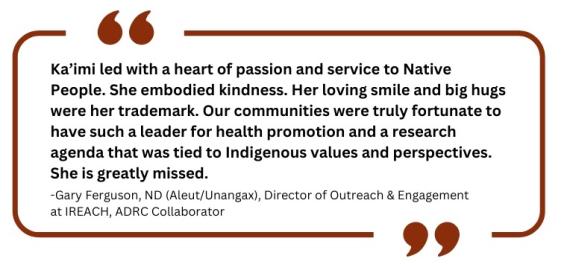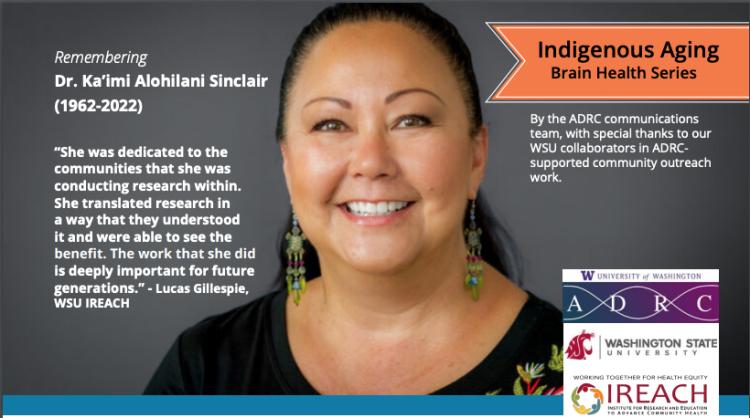As published in Dimensions Magazine for Fall/Winter 2023
Nicole lee Kamakahiolani Ellison (Fujioka-Krzyska), MPH, distinctly remembers her interview for a research project manager position at Washington State University (WSU). It had been a long drive from Olympia, so she was totally planning on changing into her professional shoes when she arrived. It wasn’t until halfway through the interview that she looked down. She was still wearing her flipflops.
“I was answering these formal questions, but of course I was distracted at the same time. By the end, I just wanted to apologize for my flip flops.”
“Oh, I didn’t even notice,” her interviewer, WSU Associate Professor Ka’imi Sinclair, PhD, MPH, had said in response to the apology.
Ellison, who is now a research project manager for the WSU Initiative for Research and Education to Advance Community Health (IREACH), appreciates this retrospectively-funny first moment with a woman who would become her supervisor, friend, and a model of successful community participatory research.
She later learned that Sinclair wore elaborate shoes whenever and wherever she wanted.
*
Ka’imi Alohilani Sinclair (Western Cherokee) (1962-2022) served as associate professor in the College of Nursing at Washington State University (WSU) and the co-director for IREACH. From 2020 through 2022, Sinclair served as co-lead of the Outreach, Recruitment and Engagement (ORE) team here at the UW Alzheimer’s Disease Research Center. In this capacity, our team had the privilege of working with her to reach American Indian and Alaska Native (AI/AN) communities and create educational resources about Alzheimer’s disease and research, along with others at IREACH.
At the time of her passing on October 16, 2022 from pancreatic cancer, Sinclair had recently been inducted into the WA State Academy of Sciences. The membership recognizes her 2 decades of scientific contributions through research to increase health equity by creating, using, and evaluating culturally informed interventions to prevent disease in health disparity populations including American Indians across the country, African Americans and Latinos in Detroit, and Native Hawaiians and Pacific Islanders in Hawaii and Washington.
Highlights of her work include the first National Institutes of Health-funded study to reduce diabetes risk among AI/AN men and the only research in Washington State focused on Native Hawaiian and Pacific Islander health, through an educational program created by and for Native Hawaiians and Pacific Islanders to manage high blood pressure and/or type 2 diabetes through reducing salt and increasing potassium in meals.

“She was dedicated to the communities that she was conducting research within,” said Lucas Gillespie, MPH, a research project manager at IREACH. “She translated research in a way that they understood it and were able to see the benefit. The work that she did is deeply important for future generations.”
One of Sinclair’s projects being continued by her team involves the Hawaiian Association of Civic Clubs. This organization helps native Hawaiians learn different trades and engage in social advocacy and civics.
For the last 5 years, Sinclair had worked with the civic clubs to administer health needs assessment surveys to participants at their big convention that is held once a year, either in Hawaii or Seattle. The association also hosts an event where they honor all the community members that have passed away that year. “It was really, really special to see all the people that she had touched,” said Ellison. “People were coming up to me and sharing little stories about her. She must have had some impact on them, considering that her past interaction with them was at a table giving them a 100-question survey to fill out. She sure had this sort of energy that made people feel comfortable.”
Ellison is now leading the data analysis of the survey answers collected over five years. “Then we’ll hopefully publish some findings and share it with the community sometime in 2024. It’s been a great learning adventure,” she says. “There’s not a lot of these kinds of data about the Native Hawaiian population. So, having a baseline understanding from Ka’imi’s work will be great.”
While people remember the sheer depth and breadth of Sinclair’s work, what they really talk about is her warm, welcoming energy, her connection to her identity and communities, and the incredible number of contacts she had from everywhere she had lived or worked. “Ka’imi was a ray of sunshine, a beacon of hope, and beam of good will and optimism,” said Dedra Buchwald, MD, a professor in the WSU Elson S. Floyd College of Medicine and the leader of the UW ADRC Native Research and Resources Core. “She reached out to many – students, colleagues, communities, and friends in an authentic and compassionate way. She was trusted.” In more words from her colleagues, Sinclair was someone who “knew everybody” and who “brought a little spice” to the world of academic research.
“I always had respect and admiration for her, but it was when she stepped in front of community at outreach events that she turned into this ball of light,” said Cole Allick, PhD, MHA (Turtle Mountain Band of Chippewa Indians), research manager and tribal liaison at IREACH. “I was always taken with her calm steadiness and how she kind of just made everything feel all figured out.”
Allick graduated in summer 2023 as one of the first four scholars to ever earn a PhD in Indigenous Health. He wrote his dissertation on Alzheimer’s disease for
this degree at the University of North Dakota, while working in Seattle at IREACH. Allick first knew Sinclair as an informal mentor on his graduate work, before formally being assigned to work with her in 2021 in the WSU Natives Engaged in Alzheimer’s Research (NEAR) Recruitment and Engagement Core and help with community ‘brain train’ events as part of our Indigenous aging effort here at the UW ADRC.
“She was intentional about helping Indigenous and Native students to succeed. If you were a Native undergraduate or graduate student interested in working in research, she made time for you,” says Allick. “As I get busier, I’m asking, how did she do all of this—and especially, do it with a smile on her face and a deep commitment to community as well?”
At the ADRC, we are grateful to Sinclair for sharing her deep connections, particularly within the elder health spheres, that helped build trust within AI/AN communities. In one impactful gesture, Ka’imi facilitated an in-depth interview with Becky Bendixen, a Tribal Program Specialist at the Northwest Regional Council in Bellingham, WA, who co-created Wisdom Warriors health program for Native Elders. Bendixen’s story, published by the UW ADRC in the Indigenous Aging brain health series of articles in 2020, raised awareness of the existence and value of such program.
“The ADRC is so thankful for the short time we had to work with and learn from Ka’imi. She was always so cheerful and welcoming, and generous with sharing her knowledge and experience,” says Kimiko Domoto-Reilly, MD, associate professor of neurology at UW Medicine, who is the co-lead of the ADRC ORE Core.
We will also remember how Sinclair, alongside Gary Ferguson, ND, IREACH Director, Outreach & Engagement, helped the UW Memory and Brain Wellness Center to represent the perspectives of AI/AN communities at our Dementia-Friendly Communities Conference and highlight the ongoing work to promote Alzheimer’s awareness and resources in Alaska, Minnesota, Nevada, and Washington.
The foundation that Sinclair built with several funded projects will continute to generate actionable knowledge about critical health interventions for a long time to come. We are grateful to our WSU Alzheimer’s research colleagues for adopting, as Allick says, “the Ka’imi way” in their work. Indeed, she left some large shoes to fill. •





